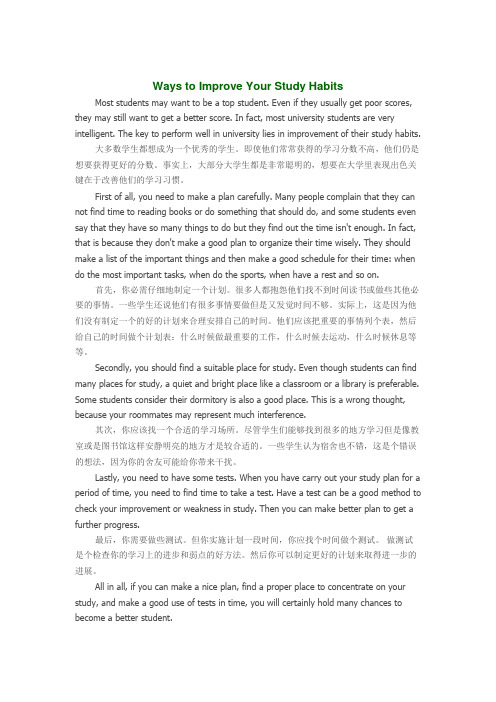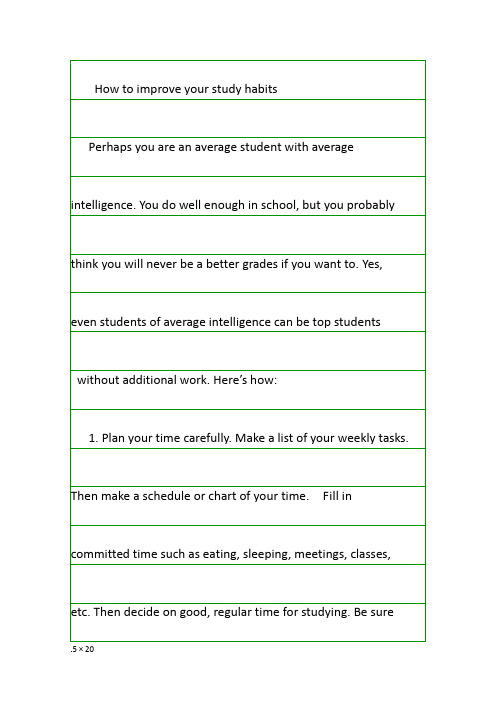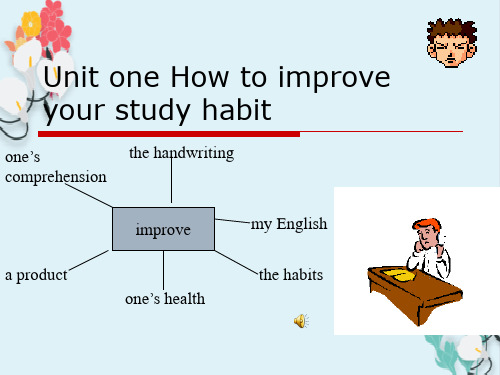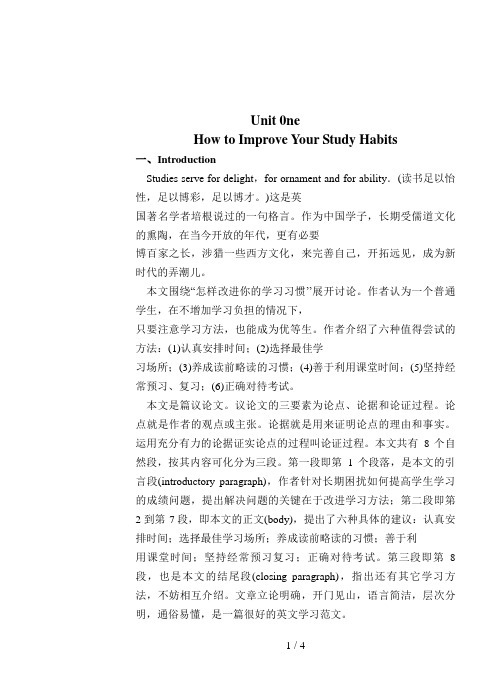Unit 1 How to Improve Your Study Habits课文翻译大学英语一
- 格式:pdf
- 大小:106.46 KB
- 文档页数:3

Ways to Improve Your Study HabitsMost students may want to be a top student. Even if they usually get poor scores, they may still want to get a better score. In fact, most university students are very intelligent. The key to perform well in university lies in improvement of their study habits.大多数学生都想成为一个优秀的学生。
即使他们常常获得的学习分数不高,他们仍是想要获得更好的分数。
事实上,大部分大学生都是非常聪明的,想要在大学里表现出色关键在于改善他们的学习习惯。
First of all, you need to make a plan carefully. Many people complain that they can not find time to reading books or do something that should do, and some students even say that they have so many things to do but they find out the time isn't enough. In fact, that is because they don't make a good plan to organize their time wisely. They should make a list of the important things and then make a good schedule for their time: when do the most important tasks, when do the sports, when have a rest and so on.首先,你必需仔细地制定一个计划。

How to improve your study habitsPerhaps you are an average student with average intelligence. You do well enough in school, but you probably think you will never be a better grades if you want to. Yes, even students of average intelligence can be top students without additional work. Here’s how:1. Plan your time carefully. Make a list of your weekly tasks. Then make a schedule or chart of your time. Fill in committed time such as eating, sleeping, meetings, classes, etc. Then decide on good, regular time for studying. Be sureto set aside enough time to complete your normal reading and work assignments. Of course, studying shouldn’t occupy all of the free time on the schedule. It’s important to set aside time for relaxation, hobbies, and entertainment as well. This weekly schedule may not solve all of your time. But it will make you more aware of how you spend your time. Furthermore, it will enable you to plan your activities so that you have adequate time for both work and play.2. Find a good place to study. Choose one place for your study area. It may be a desk or a chair at home or in theschool library, but it should be comfortable, and it should not have distractions. When you begin to work, you should be able to concentrate on the subject.3. Skim before you read. This means looking over a passage quickly before you begin to read it more carefully. As you preview the material, you get some idea of the content and how it is organized. Later when you begin to read you will recognize less important material and you may skip some of these portions. Skimming helps double you reading speed and improves your comprehension as well.4. Make good use of your time in class. Listening to what the teacher says in class means less work later. Site where you can see and hear well. Take notes to help you remember what the teacher says.5. Study regularly. Go over your notes as soon as you can after class. Review important points mentioned in class as well as points you remain confused about. Read about these points in your textbook. If you know what the teacher will discuss the next day, skim and read that material too. This will help you understand the next class. If you review yournotes and textbook regularly, the material will become more meaningful and you will remember it longer. Regular review leads to improved performance on tests.6. Develop a good attitude about tests. The purpose of a test is to show what you have learned about a subject. The world won’t end if you don’t pass a test, so don’t worry excessively about a single test. Tests provide grades, but they also let you know what you need to spend more time studying, and they help make you new knowledge permanent.There are other techniques that might help you with yourstudying. Only a few have been mentioned here. You will probably discover many others after you have tried these. Take with your classmates about their study techniques. Share with them some of the techniques you have found to be helpful. Improving your study habits will improve your grades.。

中级口语教程How to Improve Your StudyHabitsMaybe you are an average student with an average intellect.You pass mostyour subjects. You occasionally get good grades, but they are usually just average. You are more interestedhiking thanhistory, andsports thanscholarship. The factthat you don”t study very much. You probably think you will never betop student. Thisnot necessarily so, however. Anyone can becomebetter scholar if he or she wants to. Ittrue that you may not be enthusiastic about everything that you study, but by using your time properly you may improve your grades without additional work. Here”s how :. Plan your time carefully. When you plantrip, onethe first things you must doto makelistthings,take. If you don”t you are almost certainleave something important at home. When you plan your week, you should makelistthings that you havedo. Otherwise, you may forgetleave enough timecomplete an important task. After makinglist, you should makescheduleyour time.First fillcommitted time-eating, sleeping, dressing, school,meeting, ete. Then decidea good, regular timestudying. Be sureset aside enough timecompletework that, you are normally assigned each week. Of course , studying shouldn”t occupy allyour free time. Don”t forgetset aside enough timeentertainment, hobbies ,maybe just relaxation. A weekly schedule may not solve all your problems, butwill force yourealize whathappeningyour time.2. Findgood placestudy. Look aroundhouse forgood study area. Keep this space , which may bedesk or simplycorneryour room, freeeverything but study materials. No games, radios, or television! If you can”t find suchplace at home, findlibrary where you can study. When you sit downwork, concentratethe subject! And don”t gothe place you have chosen unless you are readystudy.3. Scan before you read. This means lookingpassage over quickly but thoroughly before you beginreadmore carefully. Scanningpassage lets you previewmaterialgetgeneral ideathe content. This will actually allow youskip less important material when you beginread. Scanning will help you double your reading speedimprove your comprehension.4. Make good useyour timeclass. Take advantageclass timelisteneverythingteacher says. Sit where you can seehear well. Really listeningclass means less work later. Taking notes will help you remember whatteacher says. Whenteacher gets offsubject, stop taking notes.5. Study regularly. When you get home from class, go over your notes. Reviewimportant points that your teacher mentionedclass. Read any related materialyour textbook. If you know what your teachergoingdiscussnext day, scanread that material, too. This will help you understandnext class. If you do these things regularly,material will become more meaningful,you will rememberlonger.6. Developgood attitude about tests. The purposea testto show what you have learned aboutsubject. The world won”t end if you don”t passtest, so don”t get overly worried. Tests do more than just provide grades; they let you know what you needstudy more ,they help make your new knowledge permanent.There are other techniques that might help you with your studying. Onlyhandful have been mentioned here. You will probably discover many others after you have tried these.Text BSome kindplanningessential. For one thingreveals whether you really have enoughsaythe topic you have chosen while therestill timechangeanother topic. Italso important becausestimulates your ideashelpsfix themyour mind Without some noteshelp you, you may find that you begin writing with several ideasyour head but you forget somethem as you are writing.When you have chosen your topic,perhaps havegeneral ideayour theme, make quick short notesallideas that come into your head.Remember that these should be notes-words or phrases-not sentences , which would slow you down. As you do this you will find that new ideas will comeyou,one idea leadsanother. This should not take more than ten minutes, foran examination you have no timewaste.If you have not yet decidedyour main theme , you can do sonow,thenthe main ideaeach paragraph. You may haverearrange your ideas,decide which paragraphs they will fit into,which ideas will be left out altogether.Itfor youdecide how detailed your plan should be. If you are good at writing,have had plentypractice, probably onlyfew brief notes will be necessary, but if you are not, then you may requiremore detailed plan. But remember that everibest writers needmake some notes if they are goingproducewell-organized piecewriting. You willcourse be given marksthe arrangementyour ideas.With your planfrontyou, you should be ablewrite your composition. There should be no needwriterough verseon first, then correctand makefinal copy. Thisa wastetime.Additional InformstionTherea lotmisunderstanding about studying. Most students have not been taughtprinciples behind really effective working. Abovea graph showingamountperson learns againstnumberhonrs he worksa day. If he doesn”t do any work, he learns nothing (point0). If he does an hour”s work he learnscerain amount (point ). If he does two hours” work he learns about twice as much (point 2). If he does more work he”ll learn still more (point 3). Now,he trieddo 23 /2 hours” work24, he”ll be so exhausted that he”ll hardly remember anything: what he learns will be very little (point 4). If he did less work he”d learn more (point 5).Now whateverexact shapethis curve,must havecrest. Point Xthe very maximum anyone can learnthe day. And this representsoptimum,best, amountworkdo. Itthe best possible compromise between adequate time atbooksfatigue. Fatiguean absolutely real thing; one can”t escapeor tryignore it. If you try to, if you press yourself to”work pastoptimum (and any fool can propeyelids updo 4 hoursday ) , you can only getthis downward slopeachieve less thanbest-and then get exhaustedlose your powerconcentration.The skillbeingstudent consistsgetting one”s daily study as nearoptimum point as possible.cannot tell you whatoptimum is. It differs withtypework,differs from personperson, andeventhe samepersonvaries from weekweek. You must tryfind your own. Every day you study, bear this principlethe optimummind. When you feel yourself getting fatigued, if you find yourself repeatedly reading oversame paragraphnot takingiri, that”spretty good sign you”ve reachedcrestthe dayshould stop.Most ordinary students find their optimum at about five hoursday. Yours may belittle more orlittle less-but if you getfive hours” good workday, you will be doing well.Now. what are you doing with yourself when you aren”t working? Before examinations some students do nothing at all except sita chairworry. Hereanother misunderstanding. Peop~e too easily thinkthe mind as ifworked likebody,does not. If one wantedconserve physical energycutmaximum amountfirewood, one would lie flata bedrest when one wasn”t chopping. Butmind cannot rest. Evensleep you dream, even if you forget your dreams. The mindalways turning. It gets its relaxation only by variety. Thatwhat makes mental rest.When you”ve finished your optimum hourage you must stop. Youmust not then sit aroundthe chair thinking aboutwork-that only tires without any learning. You must get outdo something. It doesn”t matter what-anything so long as you are actively doing something else but work.。

UnitOnehowtoimproveyourstudyhabit(推荐五篇)第一篇:Unit One how to improve your study habit Unit One: How to Improve Your Study HabitsWant to know how to improve your grades without having to spend more time studying? Sounds too good to be true? Well, read on...How to Improve Your Study HabitsTerhaps you are an average student with average intelligence.You do well enough in school, but you probably think you will never be a top student.This is not necessarily the case, however.You can receive better grades if you want to.Yes, even students of average intelligence can be top students without additional work.Here's how: 1.Plan your time carefully.Make a list of your weekly tasks.Then make a schedule or chart of your time.Fill in committed time such as eating, sleeping, meetings, classes, etc.Then decide on good, regular times for studying.Be sure to set aside enough time to complete your normal reading and work assignments.Of course, studying shouldn't occupy all of the free time on the schedule.It's important to set aside time for relaxation, hobbies, and entertainment as well.This weekly schedule may not solve all of your problems, but it will make you more aware of how you spend your time.Furthermore, it will enable you to plan your activities so that you have adequate time for both work and play.2.Find a good place to study.Choose one place for your study area.It may be a desk or a chair at home or in the school library, but it should be comfortable, and it should not have distractions.When you begin to work, you should be able to concentrate on the subject.3.Skim before you read.This means looking over a passage quickly before you begin to read it more carefully.As you preview the material, you get some ideaof the content and how it is ter when you begin to read you will recognize less important material and you may skip some of these portions.Skimming helps double your reading speed and improves your comprehension as well.4.Make good use of your time in class.Listening to what the teacher says in class means less work later.Sit where you can see and hear well.Take notes to help you remember what the teacher says.5.Study regularly.Go over your notes as soon as you can after class.Review important points mentioned in class as well as points you remain confused about.Read about these points in your textbook.If you know what the teacher will discuss the next day, skim and read that material too.This will help you understand the next class.If you review your notes and textbook regularly, the material will become more meaningful and you will remember it longer.Regular review leads to improved performance on test.6.Develop a good attitude about tests.The purpose of a test is to show what you have learned about a subject.The world won't end if you don't pass a test, so don't worry excessively about a single test.Tests provide grades, but they also let you know what you need to spend more time studying, and they help make your knowledge permanent.There are other techniques that might help you with your studying.Only a few have been mentioned here.You will probably discover many others after you have tried these.Talk with your classmates about their study techniques.Share with them some of the techniques you have found to be helpful.Improving your study habits will improve your grades.。


Unit 0neHow to Improve Your Study Habits一、IntroductionStudies serve for delight,for ornament and for ability.(读书足以怡性,足以博彩,足以博才。
)这是英国著名学者培根说过的一句格言。
作为中国学子,长期受儒道文化的熏陶,在当今开放的年代,更有必要博百家之长,涉猎一些西方文化,来完善自己,开拓远见,成为新时代的弄潮儿。
本文围绕“怎样改进你的学习习惯’’展开讨论。
作者认为一个普通学生,在不增加学习负担的情况下,只要注意学习方法,也能成为优等生。
作者介绍了六种值得尝试的方法:(1)认真安排时间;(2)选择最佳学习场所;(3)养成读前略读的习惯;(4)善于利用课堂时间;(5)坚持经常预习、复习;(6)正确对待考试。
本文是篇议论文。
议论文的三要素为论点、论据和论证过程。
论点就是作者的观点或主张。
论据就是用来证明论点的理由和事实。
运用充分有力的论据证实论点的过程叫论证过程。
本文共有8个自然段,按其内容可化分为三段。
第一段即第1个段落,是本文的引言段(introductory paragraph),作者针对长期困扰如何提高学生学习的成绩问题,提出解决问题的关键在于改进学习方法;第二段即第2到第7段,即本文的正文(body),提出了六种具体的建议:认真安排时间;选择最佳学习场所;养成读前略读的习惯;善于利用课堂时间;坚持经常预习复习;正确对待考试。
第三段即第8段,也是本文的结尾段(closing paragraph),指出还有其它学习方法,不妨相互介绍。
文章立论明确,开门见山,语言简洁,层次分明,通俗易懂,是一篇很好的英文学习范文。
二、Notes:1.This is not necessarily the case,however.然而,实际情况未必如此。
Be the case真的;真实情况e.g.Shenzhen has become a beautiful city,while ten years ago,it was not the case.深圳已成为一个美丽的城市,而十年前,情况并不是这样的。
Unit 1 How to Improve Your Study HabitsWant to know how to improve your grades without having to spend more time studying? Sounds too good to be true? Well, read on...Perhaps you are an average student with average intelligence. You do well enough in school, but you probably think you will never be a top student. This is not necessarily the case, however. You can receive better grades if you want to. Yes, even students of average intelligence can be top students without additional work. Here's how:1. Plan your time carefully. Make a list of your weekly tasks. Then make a schedule or chart of your time. Fill in committed time such as eating, sleeping, meetings, classes, etc. Then decide on good, regular times for studying. Be sure to set aside enough time to complete your normal reading and work assignments. Of course, studying shouldn't occupy all of the free time on the schedule. It's important to set aside time for relaxation, hobbies, and entertainment as well. This weekly schedule may not solve all of your problems, but it will make you more aware of how you spend your time. Furthermore, it will enable you to plan your activities so that you have adequate time for both work and play.2. Find a good place to study. Choose one place for your study area. It may be a desk or a chair at home or in the school library, but it should be comfortable, and it should not have distractions. When you begin to work, you should be able to concentrate on the subject.3. Skim before you read. This means looking over a passage quickly before you begin to read it more carefully. As you preview the material, you get some idea of the content and how it is organized. Later when you begin to read you will recognize less important material and you may skip some of these portions. Skimming helps double your reading speed and improves your comprehension as well.4. Make good use of your time in class. Listening to what the teacher says in class means less work later. Sit where you can see and hear well. Take notes to help you remember what the teacher says.5. Study regularly. Go over your notes as soon as you can after class. Review important points mentioned in class as well as points you remain confused about. Read about these points in your textbook. If you know what the teacher will discuss the next day, skim and read that material too. This will help you understand the next class. If you review your notes and textbook regularly, the material will become more meaningful and you will remember it longer. Regular review leads to improved performance on test.6. Develop a good attitude about tests. The purpose of a test is to show what you have learned about a subject. The world won't end if you don't pass a test, so don't worry excessively about a single test. Tests provide grades, but they also let you know what you need to spend more time studying, and they help make your knowledge permanent.There are other techniques that might help you with your studying. Only a few have been mentioned here. You will probably discover many others after you have tried these. Talk with your classmates about their study techniques. Share with them some of the techniques you have found to be helpful. Improving your study habits will improve your grades.课程开始之际,就如何使学习英语的任务更容易提出一些建议似乎正当其时。
How to Improve Your Study Habits 教学设计(Reading)Teaching Aims:1. Talk about learning strategies and habits.2. Know what skimming and scanning are and how to use them, practice the reading skills.Key Points and Difficulty:Reading skills---skimming and scanning, when and how to use themTeaching Procedure:→Step 1 Before Reading1. Read the words in Challenging Yourself together.2. Review the learning methods mentioned in Unit1 and Unit 2 and finish the task one in Before Learning.3. Discuss how to get into good study habits and share the group’s ideas.→Step 2 While Reading1. Skim the passage and match the study habits in Task 3 in Before Learning with the paragraphs marked from 1 to 6.2. Scan the passage and answer the questions.(1)Do the two “average” mean the same? what does each average mean from the context A:平局的;B 普通的? (para. 1)(2) What does “it” in “keep working towards it” mean? (para. 2)(3) Weekly (adj.) = week + ly please give some examples in this case. (para. 3)(4) Meaningful (adj.) = meaning + ful. (para. 5)→Step 3After Reading1. Do some exercises: Choose the correct answer after reading the passage. (task2 in After Reading)2. Discuss with groups and note down more methods you have used, and then report to the class.→Step 4Homework.。
Unit 1 How to Improve Your Study HabitsWant to know how to improve your grades without having to spend more time studying? Sounds too good to be true? Well, read on...Perhaps you are an average student with average intelligence. You do well enough in school, but you probably think you will never be a top student. This is not necessarily the case, however. You can receive better grades if you want to. Yes, even students of average intelligence can be top students without additional work. Here's how:1. Plan your time carefully. Make a list of your weekly tasks. Then make a schedule or chart of your time. Fill in committed time such as eating, sleeping, meetings, classes, etc. Then decide on good, regular times for studying. Be sure to set aside enough time to complete your normal reading and work assignments. Of course, studying shouldn't occupy all of the free time on the schedule. It's important to set aside time for relaxation, hobbies, and entertainment as well. This weekly schedule may not solve all of your problems, but it will make you more aware of how you spend your time. Furthermore, it will enable you to plan your activities so that you have adequate time for both work and play.2. Find a good place to study. Choose one place for your study area. It may be a desk or a chair at home or in the school library, but it should be comfortable, and it should not have distractions. When you begin to work, you should be able to concentrate on the subject.3. Skim before you read. This means looking over a passage quickly before you begin to read it more carefully. As you preview the material, you get some idea of the content and how it is organized. Later when you begin to read you will recognize less important material and you may skip some of these portions. Skimming helps double your reading speed and improves your comprehension as well.4. Make good use of your time in class. Listening to what the teacher says in class means less work later. Sit where you can see and hear well. Take notes to help you remember what the teacher says.5. Study regularly. Go over your notes as soon as you can after class. Review important points mentioned in class as well as points you remain confused about. Read about these points in your textbook. If you know what the teacher will discuss the next day, skim and read that material too. This will help you understand the next class. If you review your notes and textbook regularly, the material will become more meaningful and you will remember it longer. Regular review leads to improved performance on test.6. Develop a good attitude about tests. The purpose of a test is to show what you have learned about a subject. The world won't end if you don't pass a test, so don't worry excessively about a single test. Tests provide grades, but they also let you know what you need to spend more time studying, and they help make your knowledge permanent.There are other techniques that might help you with your studying. Only a few have been mentioned here. You will probably discover many others after you have tried these. Talk with your classmates about their study techniques. Share with them some of the techniques you have found to be helpful. Improving your study habits will improve your grades.课程开始之际,就如何使学习英语的任务更容易提出一些建议似乎正当其时。
怎样改进你的学习习惯学习英语绝非易事。
它需要刻苦和长期努力。
虽然不经过持续的刻苦努力便不能期望精通英语,然而还是有各种有用的学习策略可以用来使这一任务变得容易一些。
以下便是其中的几种。
1. 不要以完全同样的方式对待所有的生词。
你可曾因为简直无法记住所学的所有生词而抱怨自己的记忆力太差?其实,责任并不在你的记忆力。
如果你一下子把太多的生词塞进头脑,必定有一些生词会被挤出来。
你需要做的是根据生词日常使用的频率以不同的方式对待它们。
积极词汇需要经常练习,有用的词汇必须牢记,而在日常情况下不常出现的词只需见到时认识即可。
你会发现把注意力集中于积极有用的词上是扩大词汇量最有效的途径。
2.密切注意地道的表达方式。
你可曾纳闷过,为什么我们说"我对英语感兴趣"是"I'm interested in English",而说"我精于法语"则是"I'm good at French"?你可曾问过自己,为什么以英语为母语的人说"获悉消息或秘密"是"learn the news or secret",而"获悉某人的成功或到来"却是"learn of someone's success or arrival"?这些都是惯用法的例子。
在学习英语时,你不仅必须注意词义,还必须注意以英语为母语的人在日常生活中如何使用它。
3.每天听英语。
经常听英语不仅会提高你的听力,而且有助你培养说的技能。
除了专为课程准备的语言磁带外,你还可以听英语广播,看英语电视和英语电影。
第一次听录好音的英语对话或语段,你也许不能听懂很多。
先试着听懂大意,然后再反复地听。
你会发现每次重复都会听懂更多的东西。
4.抓住机会说。
的确,在学校里必须用英语进行交流的场合并不多,但你还是可以找到练习讲英语的机会。
例如,跟你的同班同学进行交谈可能就是得到一些练习的一种轻松愉快的方式。
还可以找校园里以英语为母语的人跟他们随意交谈。
或许练习讲英语最容易的方式是高声朗读,因为这在任何时间,任何地方,不需要搭档就可以做到。
例如,你可以看着图片或身边的物件,试着对它们详加描述。
你还可以复述日常情景。
在商店里购物或在餐馆里吃完饭付过账后,假装这一切都发生在一个讲英语的国家,试着用英语把它表演出来。
5.广泛阅读。
广泛阅读很重要,因为在我们的学习环境中,阅读是最重要、最可靠的语言输入来源。
在选择阅读材料时,要找你认为有趣的、不需要过多依赖词典就能看懂的东西。